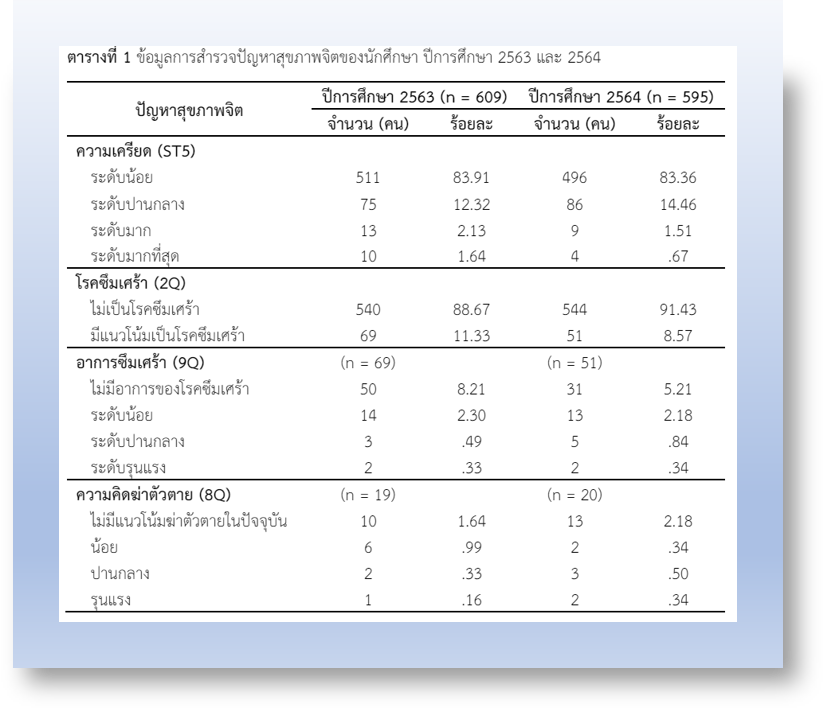The Evaluation of the Life Quality Development Project “Well - Being Center” Boromarajonani College of Nursing Chiang Mai
Keywords:
Evaluation research, Student quality of life development project, Nursing collegeAbstract
The aim of this study was to evaluate the efficacy of the “Well - Being Center” project in improving the students’ quality of life. The sample was selected through a purposive sampling method. Interviews were conducted with 24 people, including both personnel and students. The quantitative data collected from 24 students who utilized the services and students who enrolled in academic years 2020 and 2021 was 609 and 595, respectively. The instruments utilized include project interview question guidelines, service satisfaction surveys, client satisfaction surveys, and mental health questionnaires sourced from the Department of Mental Health. The project interview questions have a content validity coefficient of .85. The reliability coefficients for the service and client satisfaction questionnaires were .87 and .82, respectively. The qualitative data was examined using content analysis. The quantitative data was analyzed using descriptive statistics.
The results revealed that: 1) context evaluation: the project structure was aligned with both stakeholder needs and the institution’s policy. 2) input evaluation: the institution provided assistance in facilitating the project’s implementation. The project implementers possessed the requisite knowledge and proficiency to execute a wide range of operations. 3) process evaluation: the planning process was explicit and aligned with the project objectives, resulting in effective implementation. 4) product evaluation: students reported a significant improvement in their quality of life and were extremely satisfied with the services provided. Staff members demonstrated increased confidence in their ability to provide counseling services to students. Based on the study's findings, it is advised that the project be structured consistently.
References
Boromarajonani College of Nursing Chiang Mai. Bachelor of nursing science program. Chiang Mai: Boromarajonani College of Nursing Chiang Mai; 2022. (in Thai)
Li HM, Zhong BL. Quality of life among college students and its associated factors: a narrative review. AME Medical Journal 2022;7:38. doi: 10.21037/amj-22-96.
World Health Organization. Programme on mental health: WHOQOL user manual [Internet]. 2012 [cited 2023 Oct 18]. Available from: https://iris.who.int/bitstream/handle/10665/77932/WHO_HIS_HSI_Rev.2012.03_eng.pdf?sequence=1
Toaya N, Ta-inbod J, Cheanthongchai J, Kusonpaemsuk N, Kangjangam P, Himvech P et al. Association between quality of life and academic achievement among nursing students in Boromarajonani College of Nursing Chiang Mai [term paper]. Chiang Mai: Boromarajonani College of Nursing Chiang Mai; 2018. (in Thai)
Melarplont S, Meebunmak Y. Happiness and quality of life to COVID-19 epidemic among nursing students, Boromarajonani College of Nursing Ratchaburi. The Journal of Boromarjonani College of Nursing, Suphanburi 2022;5(1):67-78. (in Thai)
Jokthong J, Kehanak S, Chansaeng S, Jeraphakdee N, Srisodsaluk P. Quality of life of students in Sirindhorn College of Public Health Suphanburi. UBRU Journal for Public Health Research 2020;9(1):56-64. (in Thai)
Student Affair Unit. Student’s health report in academic year 2019. Chiang Mai: Boromarajonani College of Nursing Chiang Mai; 2020. (in Thai)
Stufflebeam DL. The CIPP model for evaluation. In: Stufflebeam DL, Madaus GF, Kellaghan T, editors. Evaluation models: viewpoints on educational and human services evaluation. Dordrecht: Kluwer Academic; 2003. doi: 10.1007/0-306-47559-6.
Mokekhaow K, Sukrapat W, Promla W. Factors related to stress of nursing students. Journal of Nursing Science and Health 2018;44(2):60-71. (in Thai)
Strategy and Information for Development Province Division. Summarizing descriptive information about Chiang Mai Province [Internet]. 2022 [cited 2023 Oct 18]. Available from: https://chiangmai.go.th/managing/public/D8/8D17Jan2022133138.pdf (in Thai)
Student Affair Unit. Student’s health report in academic year 2020. Chiang Mai: Boromarajonani College of Nursing Chiang Mai; 2021. (in Thai)
Kingkaew J, Boonmark N. Quality of life among nursing students in Chalermkanchana Si Sa Ket university. Journal of Sakon Nakhon Hospital 2018;21(3):105-17. (in Thai)
Areemit R, In-iw S, Manaboriboon B, Hongsanguansri S, Jaruratanasirikul S. Textbook of adolescent medicine. Nonthaburi: The Royal College of Pediatricians of Thailand and Pediatric Society of Thailand; 2016. (in Thai)
Sritharadol S, Boonchouy J. Expected and actual roles of advisors, and problems of advisory system at Faculty of Liberal Arts, Prince of Songkla University, Hat Yai Campus [Dissertation]. Songkla: Prince of Songkla University; 2014. (in Thai)
World Health Organization (WHO). COVID-19 Situation report [Internet]. 2021 [cited 2023 Oct 18]. Available from: https://ddc.moph.go.th/uploads/files/2017420210820025238.pdf
Photiwat K, Silphiphat K. Factors related to the quality of life of undergraduate students in Thailand. Rajapark Journal 2023;17(55):266-82. (in Thai)

Downloads
Published
How to Cite
Issue
Section
License
Copyright (c) 2024 Kuakarun Journal of Nursing

This work is licensed under a Creative Commons Attribution-NonCommercial-NoDerivatives 4.0 International License.
















